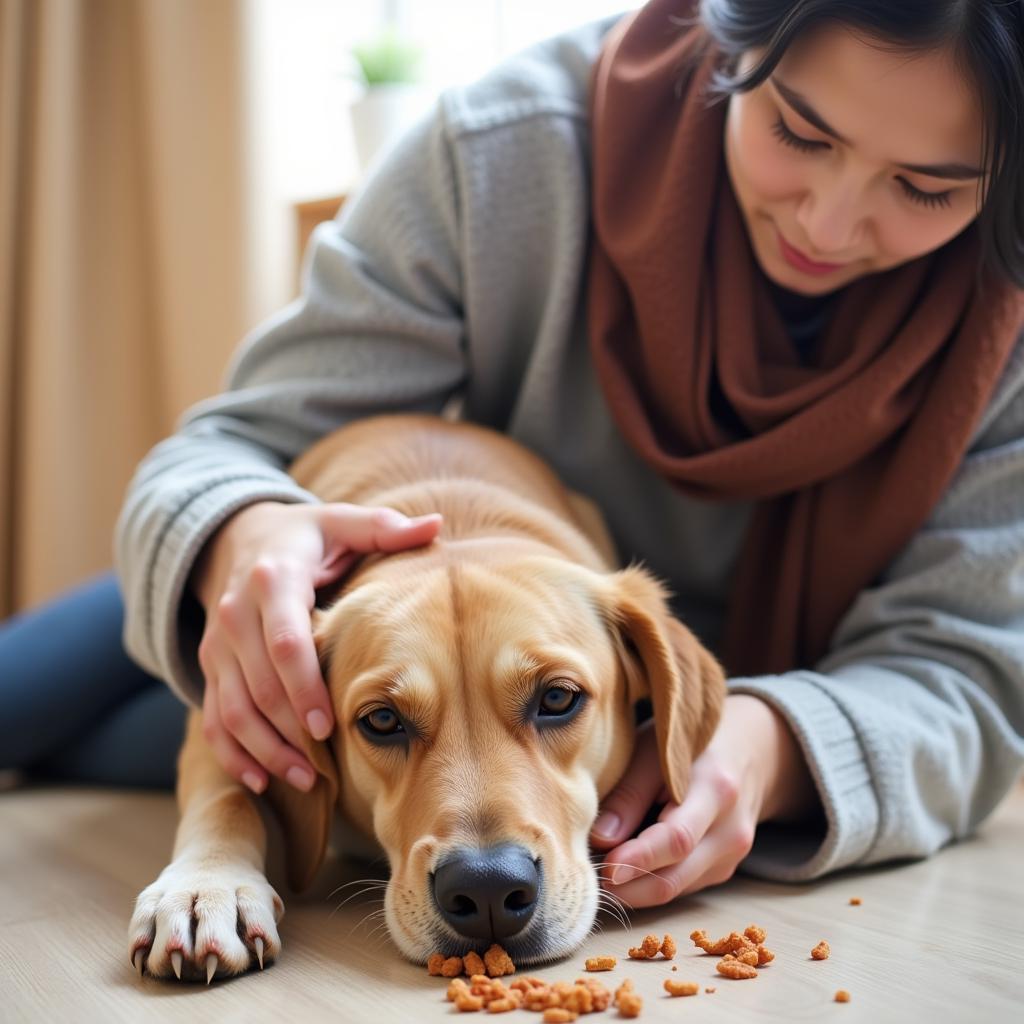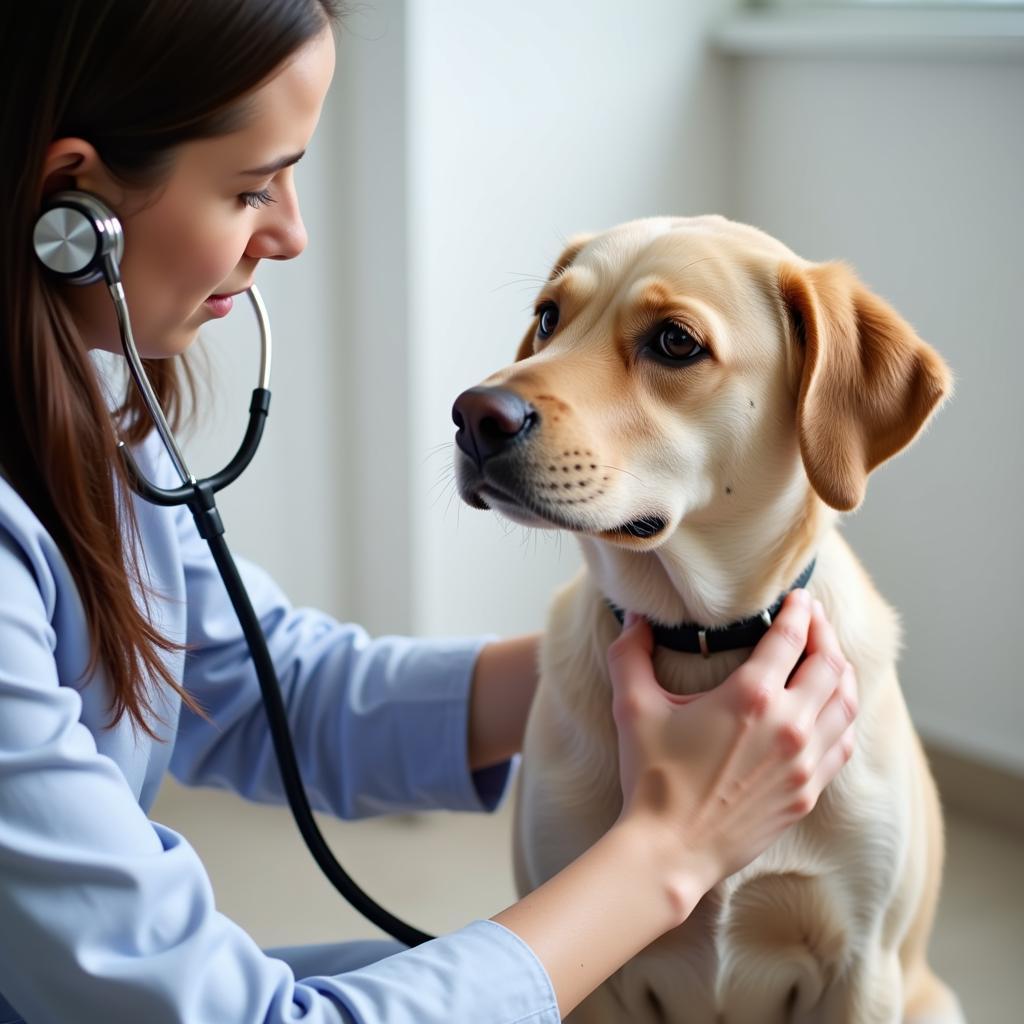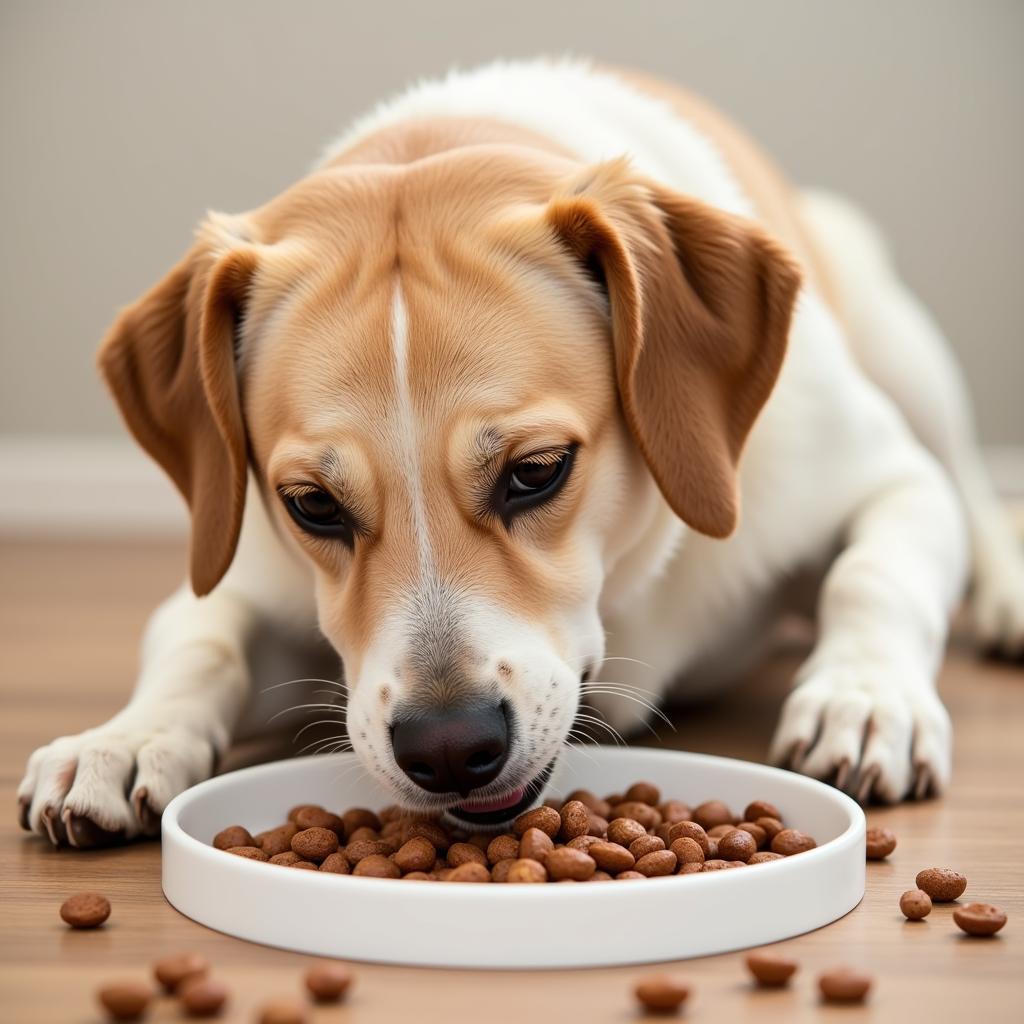Your furry friend just threw up their dinner – and it looks practically untouched. This can be alarming for any pet owner, and understandably so. When your Dog Keeps Throwing Up Undigested Food, it’s a clear sign something isn’t quite right. But don’t panic just yet! While it’s essential to take the situation seriously, understanding the potential causes can help you navigate this tricky terrain and ensure your canine companion receives the care they need.
 A worried dog owner comforting their furry friend who is throwing up undigested food
A worried dog owner comforting their furry friend who is throwing up undigested food
Why is My Dog Vomiting Undigested Food?
Vomiting undigested food, especially soon after eating, often points to a problem with how quickly your dog is eating or an issue with their esophagus (the tube connecting the mouth to the stomach). Let’s delve into some common culprits:
1. Gobbing Down Food (Literally!)
Dogs, especially those with a penchant for competitive eating, may inhale their food without proper chewing. This can lead to regurgitation, where undigested food is expelled soon after eating.
2. Food Sensitivities and Allergies
Just like humans, dogs can have adverse reactions to certain foods. If your dog consistently throws up the same undigested food, a food allergy or intolerance might be the culprit. Common culprits include beef, chicken, dairy, and wheat.
3. Gastrointestinal Obstruction
This is a serious condition where an object lodges in the digestive tract, blocking the passage of food. Symptoms can include vomiting undigested food, lethargy, loss of appetite, and abdominal pain. If you suspect an obstruction, seek immediate veterinary attention.
 A veterinarian in a white coat is carefully examining a dog experiencing vomiting
A veterinarian in a white coat is carefully examining a dog experiencing vomiting
4. Gastritis
Inflammation of the stomach lining, known as gastritis, can be triggered by various factors, including spoiled food, ingestion of foreign objects, or even stress.
5. Megaesophagus
This condition affects the esophagus’s ability to move food to the stomach, leading to regurgitation of undigested food, often accompanied by weight loss and difficulty swallowing.
When to Worry: Recognizing Red Flags
While an isolated incident of vomiting undigested food might not warrant immediate panic, it’s crucial to be vigilant for signs that signify a more serious problem. Contact your veterinarian promptly if you observe any of the following:
- Frequent vomiting (more than twice in a day)
- Blood in the vomit
- Lethargy and weakness
- Loss of appetite
- Abdominal pain or swelling
- Diarrhea
- Fever
Finding Solutions: Diagnosis and Treatment
Your veterinarian will likely conduct a thorough physical examination and inquire about your dog’s medical history and recent diet. To pinpoint the underlying cause, they may recommend additional tests such as:
- Blood tests to assess organ function and check for infection.
- X-rays or ultrasound to visualize the digestive tract and identify potential obstructions.
- Endoscopy to examine the esophagus and stomach lining.
- Food trials to pinpoint potential food allergies or sensitivities.
 A happy dog enjoying its food from a bowl at a relaxed pace
A happy dog enjoying its food from a bowl at a relaxed pace
Preventing Future Episodes: Tips for Happy Tummies
Once you’ve addressed the underlying cause with your vet’s guidance, there are proactive steps you can take to prevent your furry friend from experiencing recurring episodes of vomiting undigested food:
-
Slow Down Mealtimes: Consider using puzzle feeders or slow-feed bowls to encourage slower eating and reduce the risk of regurgitation.
-
Smaller, More Frequent Meals: Instead of one or two large meals, divide your dog’s daily food portion into smaller, more manageable meals throughout the day.
-
Choose the Right Food: Opt for high-quality, easily digestible dog food that suits your dog’s breed, age, and activity level. If allergies are suspected, discuss hypoallergenic or limited-ingredient diet options with your veterinarian.
-
Hydration is Key: Ensure your dog has access to fresh, clean water at all times, especially after meals.
-
Rule Out Underlying Conditions: Regular veterinary checkups are crucial for detecting and addressing potential health issues before they escalate.
A Word of Reassurance from Dr. Emily Carter
“Seeing your dog throw up can be unsettling, but remember, it’s a common symptom with various potential causes. Don’t jump to conclusions or self-treat. Instead, contact your veterinarian for proper diagnosis and treatment. By working together, we can get to the root of the problem and ensure your furry friend gets back to their happy, tail-wagging self!”
Conclusion
While encountering a puddle of undigested dog food can be concerning, understanding the potential reasons behind your dog throwing up undigested food empowers you to seek timely veterinary care and implement preventive measures. Remember, a healthy digestive system is vital for your dog’s overall well-being. By partnering with your veterinarian and following their recommendations, you can help ensure your canine companion enjoys a long, happy, and vomit-free life!
FAQs
1. My dog throws up undigested food hours after eating. Is that normal?
While throwing up immediately after eating is more common, vomiting undigested food hours later could still indicate a problem. It’s best to consult your veterinarian.
2. Can stress cause my dog to throw up undigested food?
Yes, stress can play a role in gastrointestinal upset, including vomiting.
3. Is it okay to withhold food if my dog throws up?
It’s generally recommended to withhold food for a short period (as advised by your vet) after vomiting to allow the stomach to settle.
4. How can I tell if my dog has a food allergy?
Food allergies often manifest as gastrointestinal issues like vomiting, diarrhea, or itchy skin. Your vet can help determine if a food allergy is the culprit.
5. What should I do if my dog is vomiting undigested food and seems lethargic?
Lethargy coupled with vomiting is a red flag. Contact your veterinarian immediately.
Need More Help?
If you’re seeking further assistance or have any concerns about your furry friend’s health, don’t hesitate to contact us. Our dedicated team at Mina Cones Food is here to support you and your canine companion on their journey to optimal well-being.
Call us at: 02437655121
Email us at: minacones@gmail.com
Visit us at: 3PGH+8R9, ĐT70A, thôn Trung, Bắc Từ Liêm, Hà Nội, Việt Nam.
Our customer care team is available 24/7 to address your questions and provide guidance.
You might also be interested in these related articles:
- Decoding Dog Vomit: What It Means and When to Worry
- Food Allergies in Dogs: Symptoms, Diagnosis, and Management
- The Importance of Digestive Health for Dogs
We’re here to help you navigate the world of canine health, one paw print at a time!